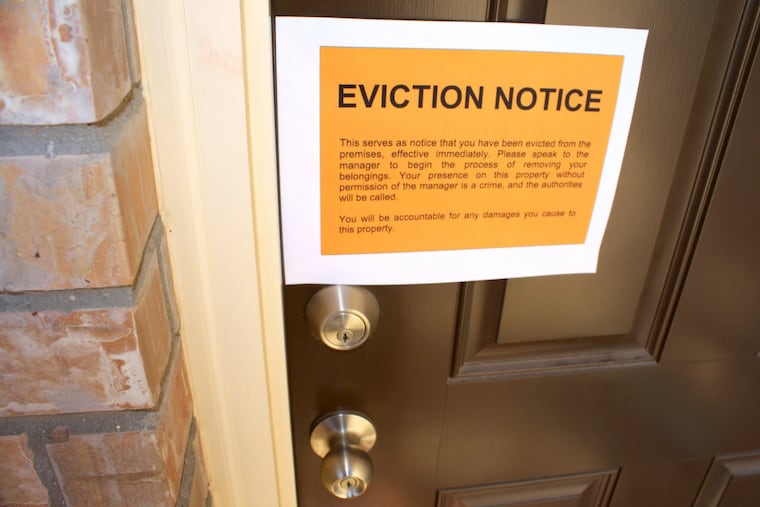Seal evictions so tenants can move forward and thrive
Unlike a bankruptcy, which is removed after seven years, a landlord filing an eviction stays on the tenant’s record even if the judge finds the tenant has done everything right.

It’s no secret that for many people, finding affordable housing is a challenge. More and more young people are living with their parents or sharing space with others who can’t afford housing. This story has been covered repeatedly, but what’s been missed is that renters face additional challenges, particularly a court system that punishes them for standing up to abusive landlords.
If a tenant follows the law and withholds rent to make repairs to the heater or plumbing, an unscrupulous landlord can file for an eviction. The tenant, if they’ve saved their receipts, may win, but will still be punished since the filing itself stays on their record forever. Unlike a bankruptcy, which is removed after seven years, a landlord filing an eviction stays on the tenant’s record even if the judge finds the tenant has done everything right. This makes it harder for the tenant to find a suitable place to rent.
Before the rise of online court records and artificial intelligence, a landlord might look to see if the tenant was actually evicted and why. But now, with services like TransUnion’s “tenant screening service and tenant background check,” fewer landlords do research on their own. Meanwhile, a recent Consumer Reports study found that almost 50% of all credit reports had errors, and it was almost impossible to correct them quickly.
As director of the Philadelphia Unemployment Project and a longtime housing counselor working with tenants in a groundbreaking mediation program in Philadelphia, I’ve seen countless cases where you need to know the full story to understand why an eviction was filed. Unfortunately, even when tenant screening reports are accurate, they don’t tell all. They may not say whether the tenant was actually evicted in the end. They most likely don’t tell the tenant’s side of the story — like if they legally withheld rent because the landlord wouldn’t repair an open sewer stack that was letting sewage flow into their basement (a real situation a client of mine faced). They certainly don’t tell if a lawsuit was filed in error by the landlord’s attorney (another situation that several of my clients have experienced).
» READ MORE: Philadelphia’s for-profit eviction system is a dangerous travesty | Editorial
Many landlords won’t rent to tenants simply because they see the word eviction in a report, regardless of the circumstances, and tenants can get stuck living in substandard and expensive housing with the only landlords willing to rent to them. According to a recent University of Michigan study, over half of tenants who participated were explicitly rejected by landlords because of a court filing, and many reported putting up with unsafe or unhealthy conditions because they were afraid their landlord would try to evict them if they spoke up.
This isn’t just a few tenants here or there. Every year, tens of thousands of Pennsylvanians face the threat of eviction. In the last year alone, more than 115,000 eviction lawsuits were filed across the state. In my time as a housing counselor, I’ve seen all sorts of situations that lead tenants and landlords to eviction court. In most cases, we’ve been able to work out an agreement to avoid court that everyone can live with, but that isn’t always the case. When we can’t work things out in mediation, the next step is court. Most counties don’t even have mediation programs, and so most tenants go straight to court. For those tenants, that’s just the start of their housing troubles, because those court records aren’t going away anytime soon.
Every year, tens of thousands of Pennsylvanians face the threat of eviction.
So, what can we do to address this? The answer is simple: We can seal eviction records. Tenants and advocates across the state have been fighting for legislation in Harrisburg that would seal court records 1) when a tenant isn’t ultimately evicted, 2) when a tenant pays off a money judgment, and 3) in cases older than seven years.
House Bill 1769 was introduced this year to do just that. It gained support from all over the state and was making good progress through the legislature. To get the support it needed to pass, it was pared back to just sealing cases after seven years, which would still have a huge impact on tenants. Unfortunately, pushback from landlords caused it to stall last month. But we’re committed to this fight because tenants shouldn’t be held back for years to come because of previous hardships or trouble with negligent landlords.
Sealing these court records would mean tenants who were never ruled in the wrong by a judge, those who made their landlords whole, and those who haven’t had an eviction in years can move forward and thrive. As we move into 2025 and a new legislative session, we will continue working with tenants and organizations across Pennsylvania to tell our elected officials that we must seal evictions now.
Adam Goldman is the executive director of the Philadelphia Unemployment Project and Unemployment Information Center.